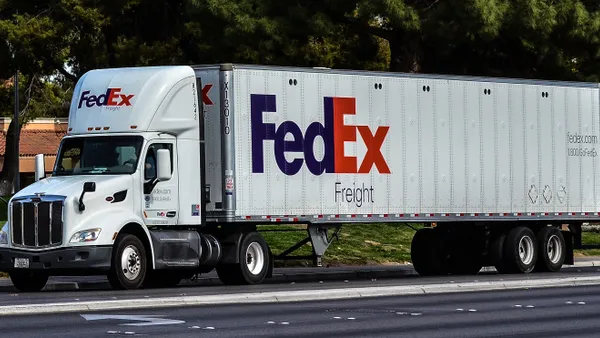Dive Brief:
- J.B. Hunt underperformed Q3 earnings targets and Knight-Swift Transportation Holdings downgraded its Q3 earnings projections this week going into peak season. While J.B. Hunt is confident the holidays will boost demand, Knight-Swift is expecting overcapacity and underperforming profits.
- "In general, freight volumes are still below 2018 levels. But we have seen seasonal uptick remain and continue its pace," Dave Mee, J.B. Hunt's CFO, said on the company's Q3 earnings call.
- Conversely, Knight-Swift's Q3 SEC filing cited increased intermodal market competition, an oversupply of capacity and downward pressure on freight rates as the reasons for downgrading its earnings forecast. The company continues to expect, "seasonal improvement in demand during the fourth quarter of 2019, however, less robust than originally projected."
Dive Insight:
While there are likely internal factors at play behind these two peak season perspectives, both carriers agree that excess capacity and soft demand aren't exactly good for business going forward.
The trucking industry has faced significant headwinds over the past year after hitting a pre-trade war peak in 2018. Now, the excess capacity carriers invested in while the market was hot is going unfilled, dragging down freight rates to the point where analysts are recommending shippers hold off on negotiating new contracts to take advantage of current low prices.
Furthermore, consistent volume decreases across the board throughout 2019 has Cass Freight Index researchers predicting the industry is headed for a recession. Already, more trucking companies went out of business in the first half of 2019 than in all of 2018, a concerning sign as other freight modes, and the overall economy, are showing signs of decline.
For J.B. Hunt, executives said on the Q3 earnings call that they don't expect spot rates to rebound significantly going into Q4 and that customer activity has been slower than usual. Terry Matthews, J.B. Hunt's president of intermodal, said the company has seen intermodal demand and pricing remain more or less flat since this time last year, which is cause for some optimism. The company saw a 2% increase in per load intermodal revenue for the quarter.
Knight-Swift has yet to have its Q3 earnings call, but its initial Q3 guidance released in July showed concerns in the company. "Revenue per loaded mile will turn negative year over year as contract rate increases lap year over year comparisons and less favorable non-contract opportunities exist in the market," the guidance said. The company posted a 6.4% decrease in intermodal revenue in Q2.
When asked if J.B. Hunt's intermodal demand had stayed afloat due to shippers rushing to avoid tariffs, Matthew said, "I haven't heard anything from our customers that they're pulling forward product and shipping it early ... So I think it's more just basically what's going on in the marketplace."
The lack of pull could also be symptomatic of broader economic uncertainty. President Donald Trump announced the U.S. government would be suspending planned increases on existing China tariffs set to go into effect on Oct. 15. The tariffs would have gone up to 30% on $250 billion worth of imports right as the holiday shopping season is about to begin. While those are off the table for now, 15% tariffs on an additional $160 billion of goods remains on track for Dec. 15 pending further negotiations.













